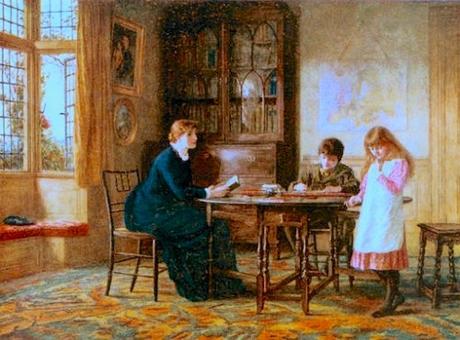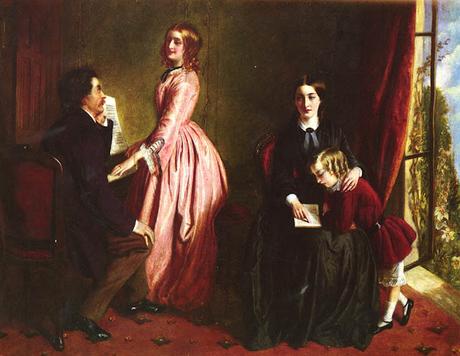
GOVERNESSES IN THE 19th CENTURY
Parents of the 19th Century required different skills from their governesses. Some governesses taught only a few subjects each day. Others oversaw the children throughout the day. Most families chose a particular governess for the lady’s strengths in specific subject matter. A “finishing” governess might be hired to prepare the older daughters for their society entrance. This might include music lessons, painting, drawing, singing, and social etiquette.
An article in The English Woman’s Journal[“Going a Governessing,” The English Woman’s Journal 1, no. 6 (1858): 399.] from an anonymous governess provides a look at her typical day. These were her instructions from her mistress:
You will not find your duties heavy. I have three young girls who will require your constant superintendence, and you must find time to read history and science and give lessons in French and on the use of globes to the elder ones. But all the reading lessons can be got through while taking you morning walk from five o’clock till six. When you come home it will be time to wash and dress the younger children, as we have prayers at seven o’clock. After prayers come breakfast, and then you might perhaps give drawing or music lessons to fill up the interval until you commence school at nine. At twelve, you will walk with the younger children until dinner. After dinner, school again until five. Then you will have tea (you will find us very punctual), and, after the meal, you can attend the elder girls while the little ones prepare their lessons for the next day. At eight, you will have to put Emily and Lucy and Georgy to bed, after which, if you have quite finished with the others, you can have all the evening to yourself.
Often, the governess would also be responsible for teaching other children from the neighborhood, all for between £20 and £30 pounds per year. Notice in the description above how the governess was not only a teacher, but, most often, also a general nurse maid to the children. One must also remember that governesses of the time often dealt with children from what we would call the “toddler” stage to those young ladies preparing to enter the marriage mart. This was a great educational challenge similar to what teachers in the settlements of the western expansion of the U.S. faced in their one-room school houses. Think of how it must have been to teach a lesson, say, in history or science or geography that would suit children from the ages of 3 or 4 to age 16.
Enjoy the excerpt below in which Darcy joins the others of his Christmas party in the schoolroom for a lesson on the Battle of Waterloo. You will love this scene from Chapter Seven. Then comment to be in the drawing for one of two eBook copies of Pemberley’s Christmas Governess.
Regina Jeffers
ABOUT THE BOOK

Pemberley’s Christmas Governess: A Holiday Pride and Prejudice Vagary
Two hearts. One kiss.
Following his wife’s death in childbirth. Fitzwilliam Darcy hopes to ease his way back into society by hosting a house party during Christmastide. He is thrilled when his cousin Colonel Fitzwilliam sends a message saying not only will he attend, but the colonel is bringing a young woman with him of whom he hopes both Darcy and his mother, Lady Matlock, will approve. Unfortunately, upon first sight, Darcy falls for the woman: He suspects beneath Miss Elizabeth Bennet’s conservative veneer lies a soul which will match his in every way; yet, she is soon to be the colonel’s wife.
Elizabeth Bennet lost her position as a governess when Lady Newland accuses Elizabeth of leading her son on. It is Christmastide, and she has no place to go and little money to hold her over until after Twelfth Night; therefore, when Lieutenant Newland’s commanding officer offers her a place at his cousin’s household for the holy days, she accepts in hopes someone at the house party can provide her a lead on a new position. Having endured personal challenges which could easily have embittered a lesser woman, to all, Elizabeth proves herself brave, intelligent, educated in the fine arts of society, and deeply honorable. Unfortunately, she is also vulnerable to the Master of Pemberley, who kindness renews her spirits and whose young daughter steals her heart. The problem is she must leave Pemberley after the holidays, and she does not know if a “memory” of Fitzwilliam Darcy will be enough to sustain her.
READ AN EXCERPT

Finding no one about, Darcy had asked after his cousin only to learn Fitzwilliam was in the school room with Miss Bennet.
Darcy knew he frowned, but he could not quite quash the idea his cousin and the lady might be enjoying some privacy, while settling things between them. His heart sighed in continued disappointment, but he managed to say, “I will not interrupt them, for now. Where might I find the countess?”
Mr. Nathan also frowned, but, obviously, for a different reason. “I beg your pardon, sir. From what I understand, most of your houseguests are in the school room. That is, all except Mr. and Mrs. Hurst and Miss Bingley.”
Darcy heard his butler’s unspoken criticism: All except those who should be there.
“And what is so fascinating about Pemberley’s nursery?” Darcy asked with a lift of his eyebrows.
“I believe Miss Bennet, sir, convinced Colonel Fitzwilliam and Captain Stewart to reenact several of the battles to which they personally stood witness. Initially, Miss Darcy and the other young ladies accompanied the colonel, but I have learned from Mrs. Reynolds how Mr. Bingley and the other two gentlemen soon followed, as did Lady Matlock.”
Darcy’s lips twitched in amusement. Apparently, Mr. Nathan did not know whether to approve of this turn of events or not. “As I possess a legitimate excuse to call upon the nursery, I believe I will follow the others.”
“As is reasonable,” Mr. Nathan said as he bowed.
Darcy smiled. “If the party is interrupting Cassandra’s nap, I will be sending them down for tea. You might warn Cook.”
“Immediately, sir.”
With anticipation, Darcy quickly climbed the steps to the nursery. He paused briefly at the door to survey the room. The colonel and Captain Stewart were describing the evening of the Duchess of Richmond’s ball in Brussels. As if they had rehearsed it, the young gentlemen in the room claimed the hand of one of the ladies, including Mrs. Anderson, and began to waltz their partners about in small circles, for the room was too cramped to move about freely. Even Hursts’ sons danced around with Megs.
It was only then did he realized the gentlemen ignored Miss Bennet’s presence in the room. The lady was framed by the window, and she was dancing, only Miss Bennet was dancing with his young daughter. Without considering his actions, Darcy slipped into the room and was standing before her when she turned around. A large smile, likely intended for his daughter or the exercise graced her lips, but he did not hesitate: Darcy placed both the woman and his child in a loose embrace and turned them in a slow circle. “Good afternoon, pumpkin,” he said as he bent his head to kiss the top of his daughter’s head, but his eyes never left Miss Bennet’s shocked gaze.
“Mr. Darcy,” she began in apology, attempting to step from his arms, but he tightened his hold just enough to dissuade her. As the rest of the room hummed the music, Darcy said softly, “I am dancing with my daughter and the most—”
However, at that moment, Colonel Fitzwilliam called out. “Such is the moment when Wellington received the message of Bonaparte’s advance. We departed the ball, many of us still wearing our evening shoes and trousers. Partners were left upon the dance floor, some women receiving a brief kiss in parting.” Although Darcy had yet to move, he knew from the sound of giggles behind him, many women in the room received a chaste kiss on their foreheads or their hands.
Such was not what Darcy wished to kiss: Miss Bennet’s lips were so tempting, for the briefest of seconds, the rest of those within the room disappeared.
Then a laughing Mrs. Anderson appeared at his side to reach for Darcy’s daughter. “It’ll be impossible to convince Miss Cassandra to sleep now she has waltzed with her father. Even so, permit me to take her, Miss Bennet.”
Darcy reluctantly released his hold on Miss Bennet and his daughter. He scooped the child from Miss Bennet’s hold and lifted Cassandra into the air, teasing another giggle from his daughter’s lips before he deposited her into Mrs. Anderson’s waiting arms.
He knew Miss Bennet took several steps backward, retreating to the window, just as he turned to the rest of the room.
“Darcy!” his cousin called. “When did you join us?”
“Only a few moments ago,” he said with a well-placed smile. “I came to inform each of you I ordered tea to be delivered to the blue sitting room. However, I did not wish to disturb your tale or the effects of the duchess’s ball on everyone.” He glanced to Cassandra. “I stole a moment to dance with my daughter and enjoy her smile.”
Bingley said, “I thought Miss Bennet entertained Miss Cassandra.”
With difficulty, Darcy kept the scowl from his features, along with the desire to slap his friend across the back of Bingley’s head. He could not understand why none of the gentlemen in the room would think to partner Miss Bennet. If Mrs. Anderson and Megs deserved partners, why did not a gentleman’s daughter—a woman with impeccable manners and a delightful personality. Moreover, if Miss Bennet was Fitzwilliam’s betrothed, why was his cousin dancing with Georgiana? Obviously, the reason the colonel had agreed to this venture was to please Miss Bennet. “She did,” Darcy said with more calm than he felt. “I imposed on the lady to hold Cassandra while Miss Bennet and I took a few turns together. Cassandra did not appear to want to leave the good lady’s care, even to dance with her father.”
Georgiana lifted her chin in a gesture Darcy had never viewed her using previously and one of which he did not approve. It was very reminiscent of a gesture Miss Bingley often employed when criticizing others. “The tea will become cold; therefore, we should go below. I, for one, have had enough of the war for one day. Countess, might you lead?”
Darcy noted the countess’s dismay. “Will you join us, Darcy?”
“I will follow in a few minutes. I wish to spend a bit of time with Cassandra before she falls asleep,” he said in encouragement.
The group nodded their acceptance and departed two-by-two, leaving only the boys, Megs, Mrs. Anderson, Cassandra, and Miss Bennet behind.
Darcy waited until the sound of their voices died away before he turned to Miss Bennet. “Will you not join us, ma’am?”
“I think not,” she said softly. “I believe I will rest for a bit, that is, if Mrs. Anderson and Megs can oversee the nursery.”
“You are not employed by Pemberley,” he reminded her. “You are a guest.”
“I prefer to be of use to the household,” she argued.
“It is not necessary,” he corrected, “but I shan’t chastise you.”
With a quick nod of farewell, the lady made her exit. Darcy again reached for his daughter. “Were you having a good time with Miss Bennet?” he asked as he settled his child in his arms. Cassandra patted his cheeks in that adorable way of all small children.
“Miss Bennet has a way with both Miss Cassandra and Mr. Hurst’s sons,” Mrs. Anderson declared. “It be a shame she be in her situation, for she’d make some man a good wife and a mother for his children.”
Darcy agreed, but he would not be that man, and the particular idea displeased him more than he would ever admit to another. He stifled a groan of despair when he realized when Colonel Fitzwilliam married Miss Bennet, they would often be in company. He did not know whether he could tolerate the situation or not. Of course, if Fitzwilliam married, his cousin would likely move into the estate which would be his inheritance, the one located in Oxfordshire. Perhaps distance would provide Darcy time to control his jealousy.

Kindle (Only $0.99 until January 1, 2022)
The book will also be available to read on Kindle Unlimited.

